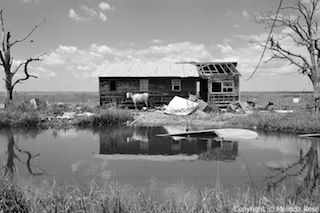A Photo Essay on the Vanishing Bayou Community of Isle de Jean Charles By Past Puffin West Grantee Melinda Rose
Photographer, Melinda Rose, has just sent PFW and her other friends and supporters of her ten-year photographic documentary project GREAT NEWS! Her photos proved to be instrumental in the awarding of 52 MILLION dollars to the 24 Native American families of Biloxi-Chitimacha-Choctow Indians who have been struggling to survive on Isle de Jean Charles which is rapidly disappearing into the Gulf off of New Orleans. The award was a result of the tireless efforts of a non profit organization, Lowland Center.
“Somewhere…down in the forgotten reaches of the Louisiana marshes, a community clings tenaciously to what remains of its homeland. “Isle de Jean Charles,” is a fragile, finger-like Island, attached to the mainland by a narrow 2 mile-long road. A good steady wind could leave you trapped on the Island for days.
Enter the hurricanes…vicious storms with sweet sounding names like Katrina and Rita swallow up this Island again and again, each time ripping up more lives and eroding away more of the Island’s land mass. “Oh we’re use to hurricanes alright,” says Chris Brunet, who is raising his orphaned niece and nephew from a wheel chair. “But since the ’50s, our barrier Islands have been eroding away…and now the salt water rushes right in and kills just about everything.”
Chris is one of 40 remaining Islanders, all descendants of the Choctaw- Chitimacha Indian tribes. These Native Americans have inhabited a once-thriving gulf community for more than a Century. The elders share stories of a once-lush prairie land textured with a variety of trees, including fig, pecan and persimmons. Today the horizon is left to tend the hauntingly beautiful remains of mighty oaks and bald cypress, their lonely bleached-out bones rising defiantly out of the soggy marshes.
The people of this battered and broken Island are living on borrowed time. And, as if they haven’t suffered enough, the massive BP oil disaster managed to strip all of the Island’s commercial fishermen of the only livelihood they’ve ever known…..” Melinda Rose




